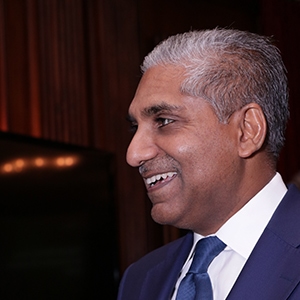Aalishaan Zaidi, global head of digital banking for retail at Standard Chartered, talks on designing tech tools that drive customer satisfaction.

Global Finance: How does Standard Chartered choose solutions that really satisfy customers?
Aalishaan Zaidi: We’re present in 30 markets across Asia, Africa and the Middle East. We know that just as these markets differ from each other, so too do the needs of our clients. That’s why we look to understand and anticipate what they need from us at different stages in their lives. When designing solutions, we’re now looking at specific client journeys, bringing in clients early in the product design phase so that what we deliver is centered on their needs and preferences. Working in agile teams, we can deliver new and improved solutions much faster than we could before.
However, it’s not just about what we offer; it’s also about how we deliver those solutions. Increasingly, people are adopting digital, self-serve channels; so it’s paramount that we design an experience that is simple and intuitive. The newest version of our SC Mobile banking app was launched in Korea recently. We adopted a human-centered design approach and iterative user testing to ensure it’s as user-friendly as possible. This resulted in its having a considerably different look and feel from traditional banking apps, and it provides clients more control and insight into their finances through new features such as personal financial management.
Finally, we recognize that collaborating with fintechs and big tech firms presents huge opportunities for us to better serve our clients with seamless banking experiences. In particular, we are looking at emerging technologies in data analytics, client authentication and conversational banking services.
GF: How can banks meet the demand for digital wealth-management tools?
Zaidi: We want to make wealth management easy and accessible to everyone. Our aim is to deliver to affluent and emerging-affluent clients the same quality of investment advice and access to solutions as was previously available only to high net worth individuals, and to innovate at speed through the use of digital platforms.
Additionally, digital is now widely adopted as a channel. People are very comfortable dealing with their finances online and on their mobile phones. This makes digital wealth-management solutions—solutions that provide independence, transparency and real-time insights based on client needs—a natural fit in the fast-paced lives of our digitally savvy clients.
Our open-architecture platform enables us to access insights and solutions from the best providers in the industry to bring these advantages to clients. In addition, our strong investment-advisory capabilities and strategic partnerships with insurers and asset managers, along with our international reach and experience in local markets, give us a significant edge over our competitors. Some of the solutions we already offer to clients in Indonesia and South Korea include goals-based investing.
GF: How can open application programming interface (API) platforms help banks engage better with customers?
Zaidi: We recognize APIs as a strategic pillar in our digital transformation journey. The plug-and-play nature of APIs opens up new services and partners to banking, so that there’s a robust digital ecosystem around banking. To accelerate our open-banking initiatives, our aXess developer platform drives more connectivity between developers, corporates and fintechs. By opening up a sandbox environment, we encourage developers to refine and innovate the best solutions for our clients.
GF: What do you think will be the top challenges and opportunities in 2020?
Zaidi: Looking ahead to 2020, there are many exciting opportunities in emerging and established markets. Following the successful launch of our digital-only bank in Côte d’Ivoire last year, this year we launched seven additional digital-only banks across Africa; and Nigeria is expected to go live at the end of this year.
We have also been granted a virtual-bank license to launch a new fully digital bank in Hong Kong. It will be part of a joint venture with PCCW, HKT and Ctrip Finance, and will integrate virtual banking into the services offered to their well-established customer bases. We see this as an opportunity to explore new business models. Our aim is to bring the best customer experience and digital banking services to Hong Kong. In addition, we have made investments in virtual-banking initiatives including LINE Bank in Taiwan and Viva Republica in South Korea.
Naturally, as we see more players enter the market, we will see increased competition. However, we believe this helps the banking industry to become more competitive, diversified and resilient.



